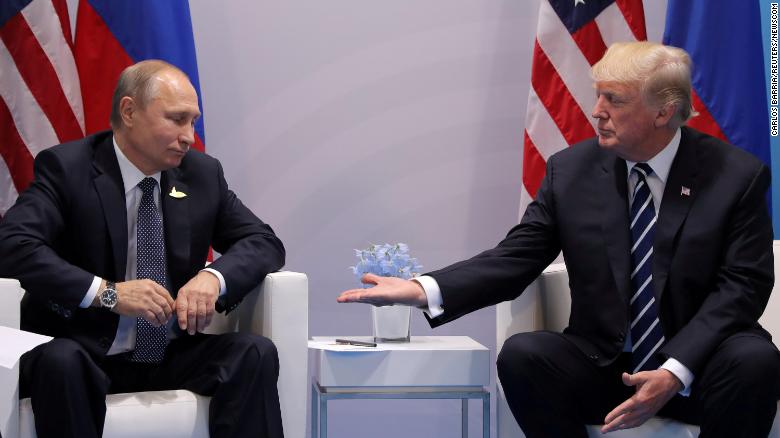Why Trump is the distraction Putin needs
When Russian President Vladimir Putin meets President Donald Trump in Helsinki, Finland, on Monday, he will be riding a symbolic high: The Helsinki summit comes a day after the World Cup final in Moscow, a prestige event that has inspired a burst of patriotism in Russia.
While Russia was eliminated in the quarterfinals in a heartbreaking penalty shootout against Croatia, Russians felt a boost in pride, joy and respect, drawn by the national team's surprisingly strong overall performance, according to state pollster VTsIOM. Some 70% of Russians watched the tournament, VTsIOM found.

Monday's summit gives Putin a chance to practice a role he has been perfecting for 18 years: Playing the statesman. Like a royal wedding or Trump's meetup in Singapore with North Korean leader Kim Jong Un, Helsinki will be an extraordinary photo opportunity for the Kremlin leader, putting him on equal footing with his American counterpart.
A one-on-one meeting with Trump gives the meticulously prepared Russian President a chance to appear the more assured player, in a sit-down with his famously brash and improvisational American counterpart.
Putin is always well briefed: His annual marathon press conference is perhaps the Kremlin leader's most telling display of his vast knowledge, having mastered the minutiae of economic data and statistics.
Beyond the fanfare, however, not everything looks rosy for Putin. The Department of Justice's announcement on Friday of the indictment of 12 Russian intelligence officers for interfering in the 2016 presidential election has led to calls for Trump to cancel the meeting with the Russian President.
That is unlikely to happen. Trump, who has been in Brussels, Belgium, and the United Kingdom this week, repeated his call for better relations with Russia several times. And Trump has repeatedly criticized the investigation, which implicates members of his own election campaign team, as a "witch hunt."
Putin's meeting with Trump may be the distraction he needs right now. Russians may have World Cup fever, but the monthlong celebrations have not translated to a sense of greater well-being for the country's citizens.
In a poll taken at the height of the World Cup, VTsIOM found that Russians reported that all indices of social well-being in June were down from the same period last year. Respondents said they felt more pessimistic about a range of factors: their financial well-being, their confidence in the economy, and their support for the political course of the country.
Compared with the same survey in mid-2014, when the country was swept with nationalistic pride over the annexation of Crimea, optimism in Russia has dropped sharply.
The main factors? Rising fuel prices and a government proposal to raise the retirement age have shaken the economic and social confidence of Russians, according to VTsIOM.
Raising the pension age is a particularly touchy issue for Russians, who inherited expectations about a social safety net from the Soviet system. The proposal to gradually raise the retirement age to 63 from 55 for women and to 65 from 60 for men has been cast as an exercise in fiscal discipline. But critics said the decision to push ahead with the unpopular plan on the opening day of the World Cup suggested the government was trying to bury bad news.
But Putin still enjoys widespread popularity. According to the independent pollster Levada Center, his approval ratings routinely hover around 80%, a figure any US president would envy. How he handles Trump in Helsinki will no doubt feed into those ratings.
The summit isn't the first meeting between Trump and Putin, and in the past, the two men have openly praised each other, with Putin especially having a knack for saying things that appeal directly to Trump. In his 2015 annual press conference, well before then-candidate Trump secured his party's nomination, Putin described Trump as "a bright and talented person" who was the clear front-runner in the race.
But much has changed since 2015, and the compliments now flow less readily. Trump suggested in a news conference on Friday he would be a tough interlocutor in Helsinki. Asked about Putin's annexation of Crimea in 2014, he blamed President Barack Obama, saying of Putin, "I don't think he would have done that with me."
In NATO, Trump criticized Germany as being "a captive of Russia" over its plans to run a gas pipeline from Russia to the country, under the Baltic Sea.
But what do Russians hope the Trump-Putin meeting achieves? They are not optimistic. More than half do not expect significant changes for their country after the one on one, a VTsIOM poll shows.
And Trump will be under pressure in the United States to confront Putin, following the 12 Russians' indictments there. Despite the unease in European capitals about Trump's recent criticism of the NATO alliance, Russians are not confident the summit will yield a real reset in rocky US-Russian relations.


Comments
Post a Comment